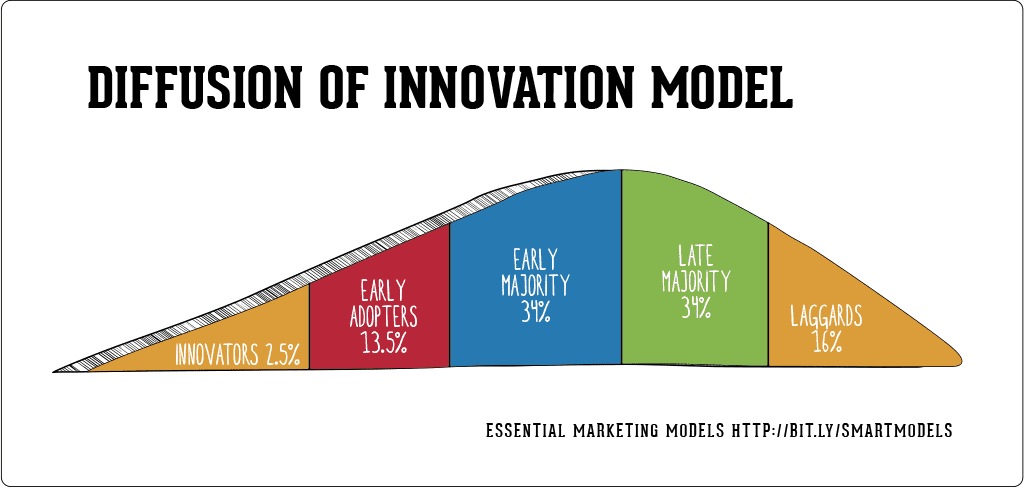Diffusion of Innovations
In 1962, Everett Rogers developed the Diffusion of Innovations theory. It is used to explain why certain technologies are created and what seems to make them flourish. It consists of 5 stages, with 5 adopter groups that explain society's role in adopting a new technology.
1. Experimental - Individuals who serve as the "pioneers." They are the innovators.
2. Uptake - Early adopters, typically the youth.
3. Critical Mess - The early majority, who are not fully educated on the new technology, but are open to it.
4. Maturation - Late adopters who usually consist of the older crowd, are skeptical until tried by majority.
5. Saturation - Laggards who are completely against the new innovations being made.

After learning more about this theory, I have reflected on certain innovations through the years. A major one being the car service, Uber.

Uber was launched in 2009, and disrupted traditional transportation. It went public 10 years later, and has grown to be the number one ride-sharing service. The appeal of this platform was the ease it provided for individuals. With one tap of a button, you can request a car in as little as 5 minutes. However, it was a very slow rise as this new innovation was not familiar. From its start, late adopters and laggards were probably very skeptical of this entire operation. But now, people of all ages have adopted this innovation and use it in their lives. This was definitely clear to me when my grandfather of 90 years old started using Uber.

Another innovation would be the highly popular vacation home and condo rental service, Airbnb. Established in 2007, and officially launched the next year. This service would be linked under the "disruptive innovation," category. This is since the entire appeal of airbnb is to provide a more affordable and easier way of getting a room for the night. It also has the opportunity to get a wider audience of customers, as you can access it on your phone.

Although these innovations were life-changing, there are still some who are skeptical. This is why we have to consider the pros and cons of each service. I think the reasons for the early-adopters taking a liking to these services are obvious. They provide seamless solutions to common problems we have on a daily. Situations like, "I'm stranded and can't catch a ride," provides the appeal for Uber. "I have a business trip and need to find a cheap place to live," provides the appeal for Airbnb.
The late-adopters and laggards may not think the same way. First off, both of these services are on mobile devices. If you are not technology savvy, it may be hard to use the platforms compared to the youth. Additionally, they take into account the safety of it all. Both services include either hitching a ride with a complete stranger, or staying in that stranger's house. Either way, it is a little bit sketchy when explaining it to a person for the first time.
A major reason why some individuals won't adopt Airbnb is due to it negatively impacting the housing market. An article by Forbes Magazine, discusses the "Airbnb Effect," on housing and the major increase in rent. According to the Economy Policy Institute, the economic cost of Airbnb outweigh the platform's benefits. Therefore, why would individuals support this new innovation if they know it's the reason why their rent is through the roof? In the article it states, "a 1% increase in Airbnb listings leads to a 0.018% increase in rents and a 0.026% increase in house prices." These percentages are very dangerous to individuals trying to find a new apartment or house.
Let's also not forget that with Airbnb, you are ultimately taking a gamble. There have been plenty of times where the customers expect something from the residence that they will not receive. This could be due to out-of-date pictures, or a misleading person trying to get more money than what they deserve.
:max_bytes(150000):strip_icc()/diffusion-of-innovations-theory.asp-final-7ffecfaf70054216b54d7d5fe1d17e32.png)
Either way, when adopting an innovation we must consider all of these factors. While I may think that Uber is the best thing since sliced bread, a laggard may never give it a chance. This theory is very interesting as it is very prevalent in our technology-based world. Who knows what other innovations are in store for us, in the future.












